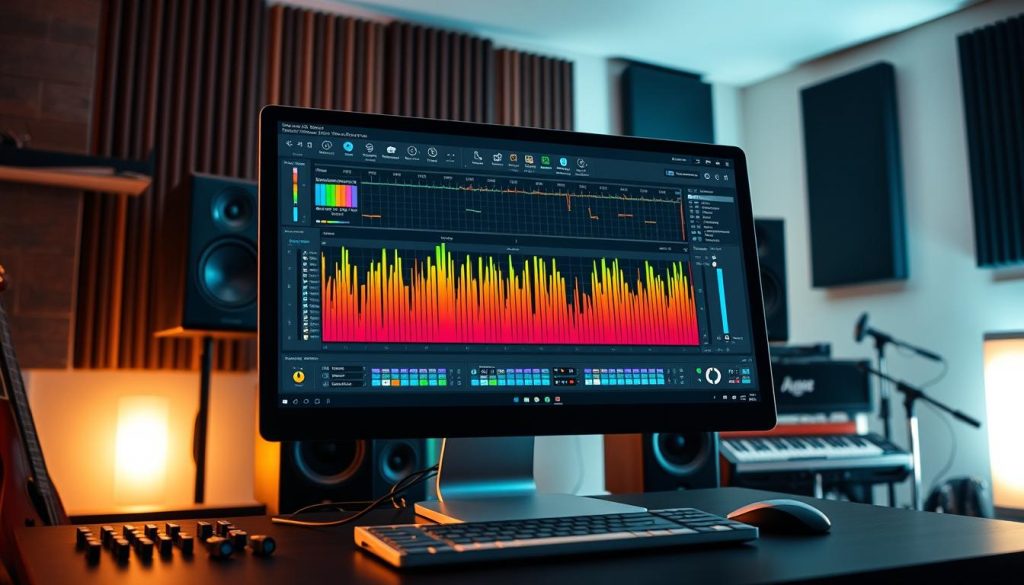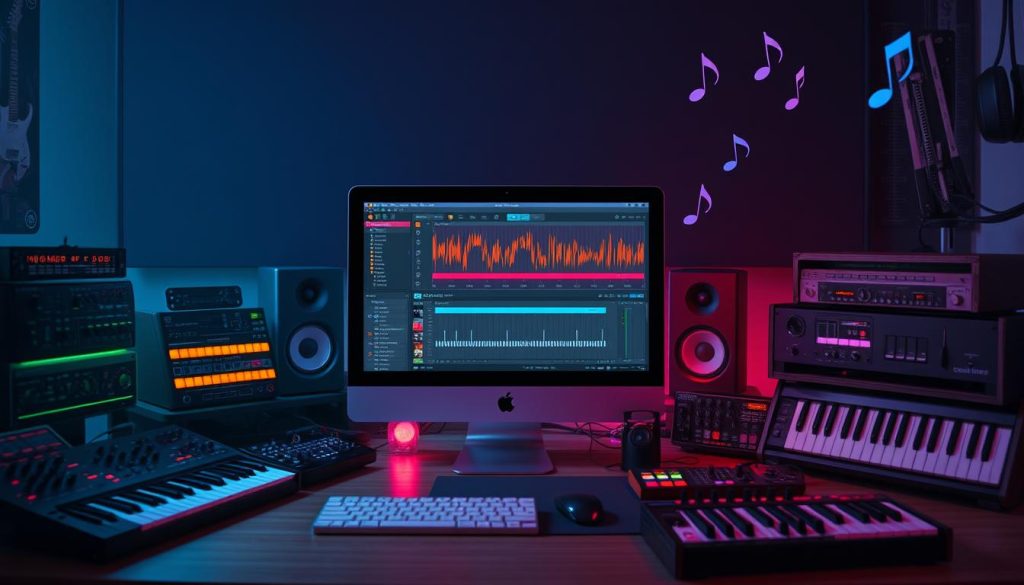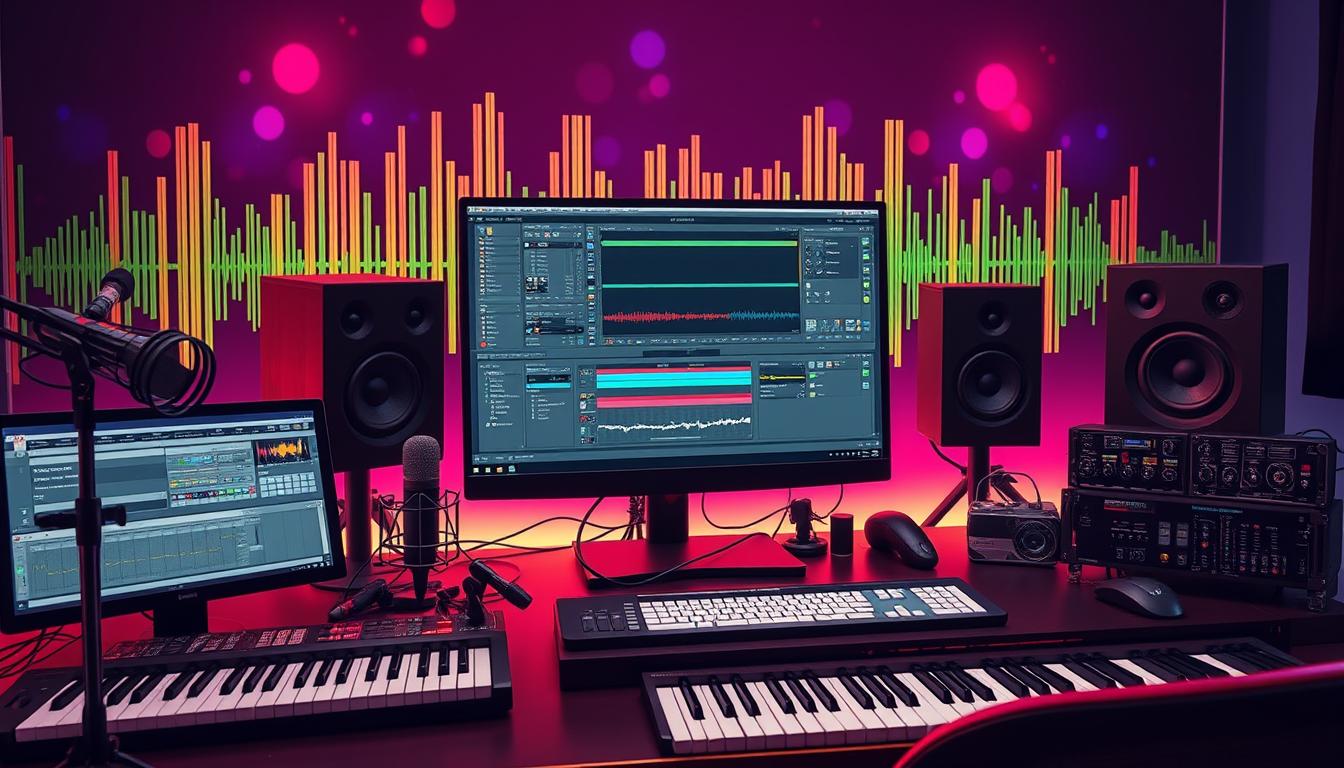As a sound engineer, the digital audio workstation (DAW) is key to my music production. The right DAW can improve my sound and make my work easier. I’ll look at the best DAWs for sound engineers in this article. I’ll talk about their main features, how well they work together, and their uses. From making music in the studio to live shows and virtual instruments, I’ll share the top choices to boost your sound engineering skills.
DAWs are vital in today’s music production. They help with recording, editing, and mixing audio. They also have many features for sound engineers. Whether you’re making a studio album, performing live, or creating virtual instruments, the right DAW is crucial.
Introduction to DAWs for Sound Engineers
As a sound engineer, you know your tools are key. The Digital Audio Workstation (DAW) is a top tool. It has changed how music is made, edited, and produced. We’ll look at what a DAW is and how it has changed music making.
What is a DAW?
A DAW is software that lets musicians and sound engineers record, edit, mix, and produce audio. It has many tools for working with sound. These tools are vital for sound engineers. DAWs help with recording, editing, and mixing, making them crucial for music production today.
The Evolution of DAWs
The first DAWs came out in the 1980s and changed music making. They were pricey and hard to use. But, over time, DAWs have gotten cheaper, easier to use, and more powerful.
Now, sound engineers have many DAWs to choose from. Each one has special features for different needs. This lets engineers work in ways that fit them best.
DAWs have gotten better with new technology. They offer more tools and features. This makes them key for making music and sound effects.
DAWs have evolved a lot, helping sound engineers like you. Next, we’ll look at what makes DAWs so important for sound work.
DAWs for sound engineers
Finding the right digital audio workstation (DAW) is key for sound engineers. It’s important for your work and projects. Look for DAWs with great audio tools, mixing power, and studio compatibility.
Key Features for Sound Engineers
Sound engineers need a DAW that’s up for complex tasks. Look for these features:
- High-quality audio tools for editing waves
- Strong mixing and processing, with many plugins and effects
- Easy MIDI editing and automation for virtual instruments
- Support for various audio formats and industry-standard plugins
Compatibility with Recording Studios
For those in professional studios, your DAW must work well with standard gear. DAWs like Pro Tools are common in studios. They make working together with others easy.
It’s key to pick a DAW that works with different audio interfaces, mics, and studio gear. This ensures a smooth workflow everywhere you go. Choosing the right DAW helps sound engineers work better and deliver top-notch audio.
Top DAW for Mainstream Audio Production

For sound engineers, Apple’s Logic Pro is a top choice in audio production. It has many virtual instruments, professional effects, and an easy-to-use interface. This makes it great for recording, mixing, and mastering audio.
Logic Pro works well with macOS, the system that runs on Apple computers. This means sound engineers can work smoothly and efficiently. They can use the powerful hardware and software of the Mac.
Logic Pro has a huge sound library with many high-quality virtual instruments and loops. This lets users easily find different sounds and textures. It helps make audio productions more dynamic and interesting.
Logic Pro also has AI tools like Smart Tempo and Drummer. These help with finding the right tempo and programming drums. They make production faster and help get the sound you want.
If you’re a pro or new to professional audio production software, Logic Pro is a great choice. It’s easy to use, has lots of features, and works well with Apple products. Many in the industry pick it for these reasons.
| Feature | Logic Pro | Competing DAW |
|---|---|---|
| Virtual Instruments | Extensive library | Limited selection |
| Effects Processing | Comprehensive suite | Lacking some key effects |
| Workflow Integration | Seamless with macOS | Requires more setup |
| AI-Powered Features | Smart Tempo, Drummer | Limited intelligent tools |
Best Virtual Instrument DAW

For sound engineers, Steinberg’s Cubase is a top choice. It’s great for virtual instruments and MIDI music production. Cubase has powerful MIDI editing and automation. It also has a big library of virtual instruments and effects.
The MixConsole in Cubase 13 has been updated. This makes mixing and sound design easier for sound engineers. It’s perfect for those who work with virtual instruments a lot.
MIDI Editing and Automation in Cubase
Cubase has some of the best MIDI editing and automation tools. You can control notes, velocity, and timing with precision. This lets sound engineers make detailed virtual instrument tracks.
Also, Cubase’s automation lets you control many parameters. This includes volume, panning, and complex effects settings.
Instrument and Plugin Bundle
Cubase comes with many virtual instruments and effects plugins. This gives sound engineers a lot of tools for making music and designing sounds. Plugins like Padshop and HALion sampler let you try out different sounds.
The DAW also supports third-party VST instruments. This means even more creative options for sound engineers.
| Feature | Cubase | Competitors |
|---|---|---|
| MIDI Editing Tools | Advanced piano roll, MIDI editor with precise control over note, velocity, and timing | Limited MIDI editing capabilities, less granular control |
| Automation Features | Comprehensive automation system with fine-tuned control over a wide range of parameters | Automation features may be more limited or less intuitive |
| Virtual Instrument Capabilities | Extensive library of high-quality virtual instruments and effects plugins, including Padshop and HALion | May have a smaller selection of virtual instruments or less advanced sound design tools |
Professional DAW for Studio Recording
Avid’s Pro Tools is the top choice for sound engineers in professional studios. It’s known for its top-notch audio editing and mixing. It also works well with many audio tools.
Pro Tools is great for making professional music. It helps sound engineers work together on big projects. The sound quality is amazing, making it perfect for picky clients.
Pro Tools works well with lots of audio gear and plugins. This means sound engineers can use their favorite tools to get the sound they want. It’s easy to use and has lots of features for editing and mixing music.
Pro Tools is the top choice for sound engineers who want the best. It’s used a lot and works well with other industry tools. It’s a key tool for serious sound engineers.
Evaluation Criteria for Sound Engineers
Choosing the right Digital Audio Workstation (DAW) is key for me as a sound engineer. It affects my workflow and creativity. I look at several important factors when picking a DAW.
First, I check the audio recording and editing features. The software must handle complex tasks in the studio well.
Then, I focus on mixing and processing tools. Having a wide range of effects, equalization, and automation is important. This lets me shape the sound just right.
Support for virtual instruments is also crucial. I need to easily add high-quality plugins and samples to my music.
How well the DAW works with my studio gear is another big factor. It should work well with my audio interfaces, MIDI controllers, and other equipment. This makes my workflow smooth and efficient.
Price, how easy it is to learn, and online resources and community support matter too. These affect my long-term productivity and skill growth.

